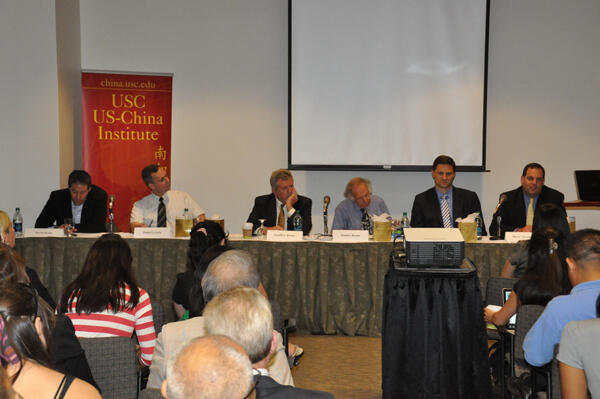The impact of Richard Nixon’s trip to Beijing was immediate. In the second hour of the program, scholars from USC and the Nixon Center in Washington will discuss China’s place in the world today, examining U.S.-China ties, global issues such as climate change, as well as China’s expanding role in the Middle East, and its relations with Asian neighbors.
Roundtable participants:
David Kang teaches international relations and business at USC and directs the Korean Studies Institute. Kang is author of China Rising: Peace, Power, and Order in East Asia (Columbia), Crony Capitalism: Corruption and Development in South Korea and the Philippines (Cambridge) and Nuclear North Korea: A Debate on Engagement Strategies (co-authored with Victor Cha, Columbia).
This video is also available on the USCI YouTube Channel.
Geoffrey Kemp directs Regional Strategic Programs at The Nixon Center. Kemp was Senior Director for Near East and South Asian Affairs on the National Security Council during the Reagan Administration. The Brooking Institution has just published his latest book, The East Moves West: India, China, and Asia's Growing Presence in the Middle East.
This video is also available on the USCI YouTube Channel.
Daniel Lynch teaches international relations at USC and is currently writing on elite Chinese conceptions of China’s future. He’s the author of Rising China and Asian Democratization: Socialization to “Global Culture” in the Political Transformations of Thailand, China, and Taiwan and After the Propaganda State: Media, Politics, and “Thought Work” in Reformed China (both Stanford University Press).
This video is also available on the USCI YouTube Channel.
Stanley Rosen teaches political science at USC and directs the East Asian Studies Center. He has written on a wide variety of topics from the Cultural Revolution to studies of Chinese education and youth culture as well as surveys of popular opinion. His most recent books include The Interplay Among Art, Politics and Commerce in Chinese Film (co-edited with Ying Zhu, Hong Kong) and State and Society in 21st century China: Crisis, Contention, and Legitimation (co-edited with Pete Gries, Rutledge Curzon).
This video is also available on the USCI YouTube Channel.
Paul Saunders is Executive Director of The Nixon Center and publishes its bimonthly foreign policy magazine, The National Interest. He heads the Center’s U.S. - Russian Relations Program and works on other issues, including energy and climate change. Saunders was Senior Advisor to the Under Secretary of State for Global Affairs during the George W. Bush Administration.
This video is also available on the USCI YouTube Channel.
Drew Thompson is Starr Senior Fellow at The Nixon Center and heads its China program. He was previously assistant director of the China studies program at the Center for Strategic and International Studies. Earlier he directed the China-MSD HIV/AIDS Partnership in Beijing and had an extensive business career in China. His articles have appeared in Foreign Policy, the Financial Times, and many other publications.
This video is also available on the USCI YouTube Channel.
Click here to view the first part of the symposium featuring top Nixon assistants discussing “the week that changed the world.”
In the video player below, click the tumbnail of the presentation you wish to watch and then play in order to view it..




